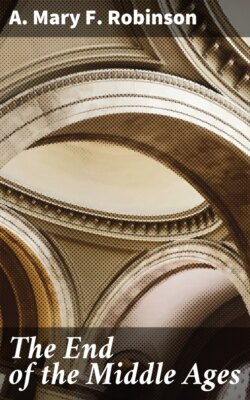Читать книгу The End of the Middle Ages - A. Mary F. Robinson - Страница 13
На сайте Литреса книга снята с продажи.
X.
ОглавлениеTable of Contents
From the year 1312 until 1320 Master Eckhart, the great Dominican preacher, was living in Strasburg. His deep and original mind, which so vastly was to influence the speculation of his time, was now itself brought under the influence of Beguinism. From 1312 to 1317 he preached and visited in the Dominican beguinages of Strasburg. Always a mystic and a neoplatonist, before that date he was not suspected of heresyheresy. The theories of the Dominican Beguines agreed perfectly with the convictions of this singular being, who preached in accents of strenuous sincerity the doctrine of the unreality of matter.
Among the Beguines of his diocese was one whom Eckhart adopted to be his spiritual daughter. But the relation of the Beguine Sister Katrei to the great Vicar-general of the Dominican order was scarcely that attitude of submission which we expect from a penitent to her confessor. She leads him on to new audacities of faith, suggests new penances, refuses all restraint. She shows him how an earnest nature can reduce to practice his special tenet that the world is nothing, that God alone exists.
Katrei was the daughter of worthy Strasburg townspeople. Not necessity, but an enthusiasm for self-humiliation drove her to the beguinage. Ever in doubt of her own salvation, she multiplied her fasts and penances till even her director beseeched her to take some pity on her starved and shattered body. But Katrei would not be persuaded; not yet, she declared, was the old Adam slain in her; not yet was she “dead all through.” As Mechtild of Magdeburg is the great active type of the order, so Katrei represents the passive Beguinism. She had no reforming zeal; she belonged to the later school, to those who said: “Not even the desire of the kingdom of heaven must tempt a good man towards activity.”
To free herself from the world and the claims of the world, to leave behind the flesh and all the needs and desires of the flesh, this was the overmastering preoccupation of Swester Katrei. She left the sheltering beguinage, the faces too familiar to be easily forgotten, the neighbourhood of father and of mother, and set out alone upon the wandering Beguine’s life. With her she took neither staff nor scrip. “All that I ask of the world,” she said, “is a spring, a crust, and a garment” (brunnen, brod, und ein rock). So for many months she went, absorbed in her own soul, forgetting men and women, earthly pleasure, earthly love, and earthly duty, and at last returned to Strasburg to be known by no one there.
She was not yet satisfied. Her ideal was not yet reached. “Not yet,” she persisted, “am I dead all through.” “Nay,” answered the confessor (behind whose cowl we see the face of Eckhart), “not so long as thou rememberest who was thy father and who thy mother; not so long as thou shalt care if thy priest refused to confess thee or absolve thee; not so long as it shall disturb thee if thou mayest not taste the body of God; not so long as thou shalt grieve when none will shelter thee, and all despise thee; not until then, my sister, canst thou know the real death unto self.” Then again, Katrei retired into the wilderness, and for a long time she wandered to and fro across the face of the earth. When she returned she was strangely changed; even her confessor did not know her. At last, her cataleptic trances growing daily longer and more profound, she being permanently raised into a strange hysteric insensibility to pain or hunger, she lay the whole day long without food or drink or movement in a corner of the great cathedral. Now she was dead to outer things. “Now,” she said, “I am God.” Her father and her mother came and cried to her, half abashed at her holiness, half agonized at her condition. But Katrei did not know them now. She no longer recognized what she looked upon; the world and all within it was a blank to her.
At last, one day, the trance deepened; she ceased to breathe. Some people of the church, thinking her dead, took her away to bury her. But when they returned to the church with Katrei on the bier, her confessor, approaching, perceived she was not really dead. “Art thou satisfied?” he demanded; and she answered, “I am satisfied at last.” She would have let them bury her.
Quietism can go no further than this. When this singular woman died, between 1312 and 1320, though the Church already began to censure the mystical errors of Beguinism, yet her piety was deemed so great that Meister Eckhart wrote a memoir of her life as an example and an exhortation to the pious. She is the saint of the later Beguinism, even as the vigorous Mechtild of Magdeburg is the patron of the older style.
